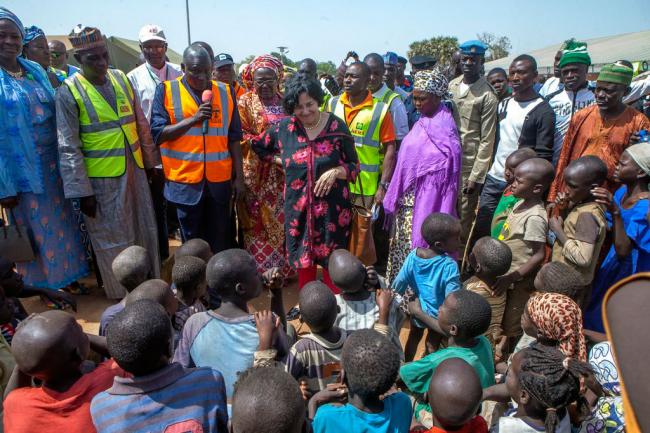
‘We cannot forget the girls from Chibok’ – UN child rights envoy
“It is up to us to be their voice and give them back the life they deserve,” said Leila Zerrougui, Special Representative of the Secretary-General for Children and Armed Conflict, in a message on the anniversary.
Two years ago, in the middle of the night, 276 girls were abducted by Boko Haram from their school dormitory in Chibok, in Nigeria’s northeast. Fifty-seven escaped hours later but what happened to the remaining 219 girls has been unknown.
In the past two years, the conflict has continued to grow and Boko Haram’s activities have spilled over into the neighbouring countries of Cameroon, Chad and Niger. More children have been abducted. Hundreds of boys and girls have been killed, maimed and recruited by Boko Haram.
Children used as suicide bombers
In what has become one of the armed group’s most gruesome tactics, women and children, girls in particular, have been forced to serve as suicide bombers in crowded markets and public places, killing many civilians.
It is no surprise that in the midst of such violence, families decided to flee to safer areas in Nigeria, and to neighbouring countries. With over two million people displaced, including more than one million children, often separated from their families, the UN has described these massive displacements as one of the fastest growing crises in Africa.
In the past year, as the Government of Nigeria has retaken control of some territory in the country’s northeast, Boko Haram captives were liberated or have been able to escape, including many children.
Girls and boys told distressing stories about their captivity, including how entire villages were burned to the ground, and recounted stories of rape and sexual violence, recruitment and use of children by the group, as well as other violations.
“These children yearn for the safety of their families, but going back to their communities can mean persecution and mistrust,” she said. “Girls who come back as young mothers face even greater challenges. These traumatized children require assistance and our support to fight stigma and rejection.”
Children missing out on education
The conflict’s impact on education has been no less profound. Over 1,500 schools in northeastern Nigeria have been destroyed and the teachers are gone. Hundreds of thousands of children are missing out on their education. The international community’s efforts to support initiatives to bring children back to school are essential and must be maintained.
Much has been done to help children reintegrate back into their communities and return to school, but the need far exceeds the resources available.
“It is our collective responsibility to keep shining a spotlight on these children in need and ensure they have a future in which they can overcome these challenges,” she said.
The abduction of the Chibok girls catalyzed international action, including in the Security Council. In June 2015, Council members adopted resolution 2225 that made the act of abduction by an armed group or force a trigger to list them in the annexes of the Secretary-General’s annual report on children and armed conflict, she noted.
This means future acts of abduction, like in Chibok, can translate into a listing for those perpetrators and increase pressure on them by the international community.
“We cannot tolerate the abduction of children. We cannot forget the girls from Chibok,” she said.
Photo: UN
Support Our Journalism
We cannot do without you.. your contribution supports unbiased journalism
IBNS is not driven by any ism- not wokeism, not racism, not skewed secularism, not hyper right-wing or left liberal ideals, nor by any hardline religious beliefs or hyper nationalism. We want to serve you good old objective news, as they are. We do not judge or preach. We let people decide for themselves. We only try to present factual and well-sourced news.







